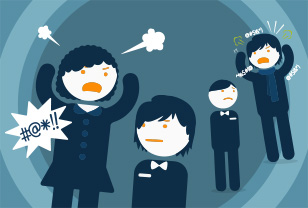

Related Articles
Related Articles
Handling Customer Complaints
Explore More
Customer Service Training
Workplace Health And Safety
Dealing With Customers Online
Business Phone Etiquette
Time Management
Learner Engagement
Prevent Customer Churn
Customer Satisfaction
Handling Customer Complaints
Sales Training
Every business, no matter how successful, will get customer complaints.
The question is: how does your team respond to complaints from customer? How can your business not only address customer concerns, but also gain trust and respect in the process? How can you effectively solve specific customer problems, and overarching business issues at the same time?
Handling complaints in a customer service role takes skill.
Your customer service professionals have to exhibit empathy and compassion with the customer’s position, keep a composed demeanour, but also be able to say “no” in a firm yet supportive way – and not just in person! Your team will have to alleviate customer frustration over the phone and online too – which takes an added skillset to accomplish effectively
What core competencies are necessary for every customer service representative – especially when dealing with difficult customer interactions?
1. Active Listening Skills
If possible, your employees should take notes while the customer makes their complaint. Your team member should be able to repeat the customer’s complaint back to them, using their words, to show and confirm they’ve understood the problem correctly – in person, online, over the phone – wherever they’re interacting with customers.

2. Gratitude
Remember that every bad review, angry social media message, or disappointed email is a chance for your individual staff members and your organisation to improve. Your staff should thank the customer for bringing the issue to your attention rather than just complaining to other customers!

3. Sincerity
It’s important to apologise with a heartfelt, compassionate statement. For example: “I truly apologise for this situation – if this happened to me, I would be frustrated too.”

4. Planning
Your team should know and be able to outline the steps that can be taken to fix the problem, ensuring they are realistic about outcomes and the timeline.

5. Action
After confirming that the customer is happy with the plan, your staff must take action to resolve the issue. Then, follow up with the customer to see if everything has met an acceptable conclusion.

Businesses should have systems in place to make handling customer complaints efficient, simple, and trackable. Everyone on your customer-facing team should have the training and the tools to resolve customer complaints to a reasonable degree.
Make sure you have systems in place to log complaints and relevant details about how they were resolved, how quickly, and any insights to be gained from the interaction. Did they find a flaw on the website? Were they unhappy with a certain aspect of your product? Were there shipping delays? Ensure your team has the capacity to not only fix individual issues, but the ability to highlight systemic or organisational problems to senior management that will then be followed up and rectified.
Handling customer complaints can be an emotionally charged, difficult process – but with the right skills, and proper training, your team will be able to send customers away satisfied, and improve your business at the same time!
Watch Recognising Customer Disappointment
If you want to be certain that your team is fully prepared for any customer – and any customer service situation – consider training with Canity.com!
 Quick
Quick Effective
Effective Entertaining
Entertaining
Choose from a variety of topics, including Dealing with Difficult Customers, Email Skills, Phone Skills, Saving Customer Cancellations, Sales Skills, and much more!
Most Popular Blogs















Published by Canity